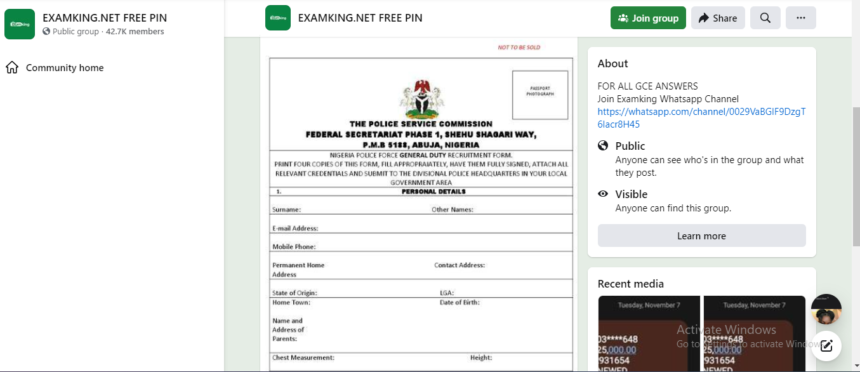Claim: Some people on Facebook share a picture with a link claiming it takes you to apply for the Nigeria Police Force Recruitment.
Verdict: The provided link is deceptive and does not originate from the Nigerian Police Force.
Full Text:
Nigeria’s high unemployment rate has left many desperate for jobs and vulnerable to fraudsters who are quick to either steal from these job seekers or steal their information.
While many who have fallen victim have shared their experiences, many more, due to many reasons, are still falling victim.
Recently, a Facebook account shared an image of what appeared to be an application form fro the Police Service Commission. The image was shared with the caption;
“ NIGERIA POLICE FORCE APPLICATION FORM 2023 LINK. Link; (https://tinyurl.com/Apply-NigeriaPolice).”
The post made on October 13, 2023, has 22 likes. But similar posts with the same narrative have been shared here, here, here, and here.
The possibility of this going viral and innocent job seekers falling victim to identity theft is why Prime Progress chose to verify the claim.
Verification
To verify the authenticity of the claim, Prime Progress first clicked on the link, which led to a suspicious webpage.

The first thing that raised our suspicion was the URL, which is like the address of the webpage. For most Nigerian government websites, the URL carries .gov.ng (gov being government and ng being Nigeria), but this particular website’s URL was Jambpin.com, with the logo of the Joint Admission Matriculation Board and not that of the Nigerian Police.
On this page, we were asked to fill in details like name, gender and country of residence.
After filling in the details, the website redirected us to the Second stage, which further read;
“ Your Application for the ongoing NIGERIA POLICE FORCE APPLICATION is now on process. Kindly Validate your Name to proceed to the next step. Note! The Number of Applicant is limited.”
Just beneath this was a comment section where people testified about how their applications were approved.

Unlike the Facebook accounts that shared links for the job applications, which had little or no engagements, this page showed 23,000 comments, 12,000 shares, and a section with a total number of 134,000, with no indication as to what it represents.
More interestingly, was how the number kept increasing every second. The comments, for instance, kept increasing by a thousand, and within 7 seconds, it got to 35,000 and was still going. This was also the same for the other numbers.
Even with a large number of engagements, only 4 comments were accessible to read, even as the numbers were growing.

The third stage of the procedure landed us on the congratulatory page, where we were asked to share the link to the page with 5 persons or groups on WhatsApp, unusual for any genuine job application. This was only how we could get the application form, the page claimed.
After sharing as demanded, instead of the application form, we were redirected to a page that showed a “ Print now” inscription for us to click. In doing so, it took us to a URL-shortening service, which had nothing to do with the job application.
So, after going through all the procedures, there was no police recruitment application form on the website.
Is there a Police recruitment?

To dig deeper into the claim, Prime Progress searched through the official Twitter handle of the Nigeria Police and discovered that on the 13th of October, 2923, the Police posted a statement announcing the commencement of recruitment.
The statement contained a link different from what was shared by Examkinng.
What this is about?
The initial phase of the job application process can be likened to URL phishing, where scammers employ authoritative figures, compelling images, or persuasive narratives to deceive individuals into thinking that everything offered is legitimate. However, this facade quickly shifts as the fraudsters closely monitor their targets and cleverly manipulate them until they fall victim to the scheme.
The subsequent phase in the application process can be characterized as engagement bait. This involves crafting social media posts intended to provoke interactions with seemingly harmless content through likes, follows, shares, and comments. While various objectives exist for these tactics, in this instance, the primary aim is to mislead and perpetrate fraudulent activities.
Rachel Idim, a cyber security specialist, explained that the end goal of the use of these misleading links is to steal from the unsuspecting job applicant.
“ Hackers are very smart, and the general method of phishing and snitching is called social engineering. First of all, they provide people with what they need, in this case, a job vacancy which is truly ongoing, and provide a fake link that could have similarities with the actual one and lure people into going through with a whole process that would only lead to scam,” she said.
Idim added that it is advisable to ignore links requiring applicants or users to share the same link groups before they complete the process or keep clicking for an endless, unstable process.
By doing so, she says the channels for more scams are spread to others while also fetching important information from the user to execute the initial plan of cyber theft.
She also shared a website that could be used to check for the authenticity of suspicious links before clicking. See here.
Conclusion
The Nigerian Police Force’s recruitment is ongoing. It commenced on October 15th and will be closing on 26th November, 2023. This, however, has nothing to do with the links shared by some Facebook accounts.





